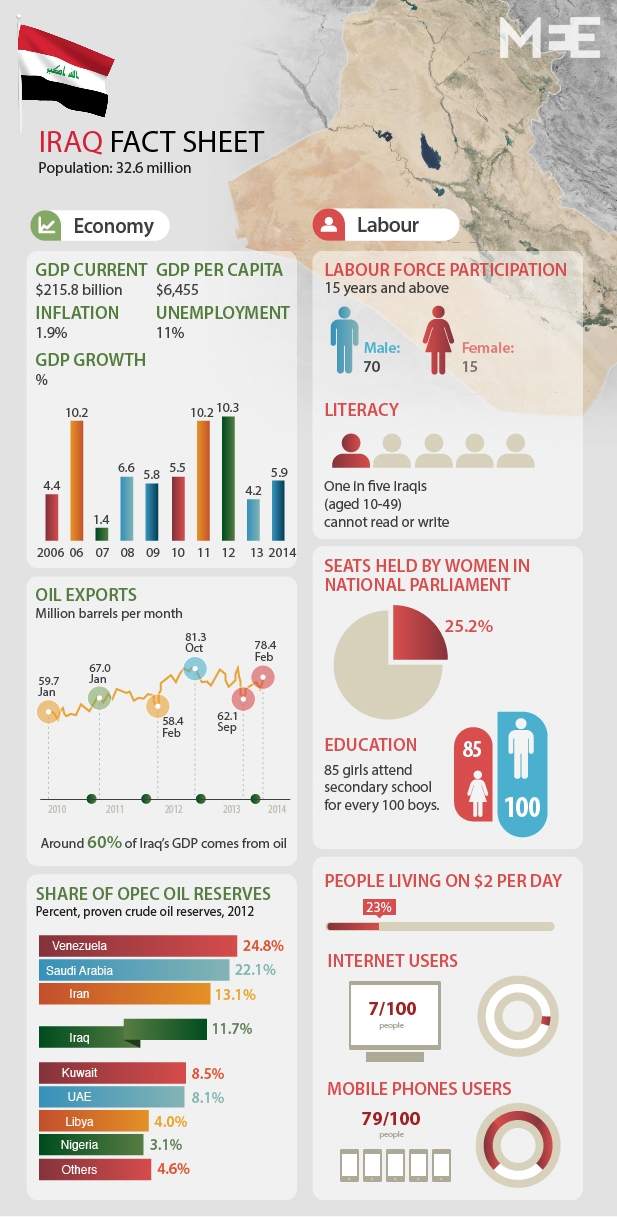Key facts about Iraq's election

Polling in the election will start and end on Wednesday. Iraqis in security roles and certain other professions voted on Monday 28 April, while expatriates have voted by post in the weeks before.
The key candidates
There are 9,039 candidates from 277 political blocs standing for a seat in the 328-strong parliament.
More than 20 million Iraqis are eligible to vote, with 48,796 polling stations nationwide.
No single party is expected to win a simple majority on its own and subsequent coalition negotiations are expected to take months. Tribal allegiances and sectarian affiliations play a key role in voting.
Who is the favourite?
Prime Minister Nuri al-Maliki's State of Law alliance is widely expected to win the biggest number of seats.
With no unifying opposition figure, Maliki is expected to stay in the post he has held since 2006 despite growing grievances with his rule.
Shiite blocs challenging Maliki include the Ahrar movement, linked to cleric Moqtada al-Sadr, and the Citizens bloc, a formerly powerful group seen as close to Iran.
Election-related violence
Almost 3,000 people have been killed in Iraq already this year, fuelling fears that Iraq could slip back into all-out conflict and the bloody Shiite-Sunni sectarian war of 2006-2008.
Fallujah, a city just west of Baghdad, is currently at the centre of the security crisis. Its takeover by ISIL forces in January 2014 forces has lead the Iraqi army to besiege the city and launch a series of offensives. Fears are mounting that the conflict could spill over to the capital.
What is the parliamentary structure?
Under an unwritten agreement, the president is Kurdish, the prime minister is a Shiite and Sunnis choose the speaker of parliament.
Iraqi leaders have in the past opted for national unity governments, but Maliki has pushed for a majority government, arguing that it will be better able to pass legislation.
International influence
Iraq borders Iran, Syria, Turkey and Saudi Arabia, and politicians frequently claim neighbouring states influence policy and negotiations. Maliki has also blamed the civil war in Syria for higher levels of unrest in Iraq, and accused Saudi Arabia and Qatar of backing militants.
The United States is seen to have lost influence since its troops withdrew in December 2011, but it is still Iraq's main arms supplier.
Iran is seen as having a strong influence over who becomes prime minister and is regularly accused of directly funding individual parties.
Key facts:
Geography: Bordered by Turkey, Syria, Jordan, Saudi Arabia, Iran and Kuwait, Iraq has a narrow outlet to the sea on the Gulf, and a surface area of 438,317 square kilometres (169,235 square miles).Population: 34.8 million, of whom about 75-80 percent are Arabs and 15-20 percent Kurds, mainly living in the autonomous north.
Religion: 97 percent of the population is Muslim, with the remainder made up mostly of Christians but also small sects including Yazidis, Shabaks and Sabeans. Of the Muslim population, 60-65 percent are Shiite, and the remainder Sunni. The Christian population has more than halved since the 2003 US-led invasion.
Economy: Iraq depends heavily on oil exports, which touched 2.8 million barrels per day in early 2014. Its proven deposits of oil and gas are among the world's highest. Crude exports account for over 70 percent of GDP, and more than 95 percent of government revenue. In March 2013, the International Monetary Fund said Iraq still suffers "severe structural weaknesses", including high unemployment and a limited non-oil sector.
GDP per capita: $6,377 (World Bank)
Recent History: Today's Iraq covers much of ancient Mesopotamia, one of the cradles of civilisation. In the early modern era it became part of the Ottoman Empire.
British-ruled in the early 20th century, Iraq became formally independent in 1932. The monarchy was abolished in 1958 after a coup and a republic was established.
Saddam Hussein became president in 1979, 11 years after his Baath party took control.
Several wars have shaken the country - the 1980-1988 Iraq-Iran war, the 1991 Gulf War over Kuwait and the US-led invasion in March 2003 which ousted Saddam, who was later executed.
After the departure of American soldiers in late 2011, Iraq was plunged into crisis and violence has surged to its worst since a Sunni-Shiite sectarian war in 2006-07. Since March 2003, at least 122,977 civilians have been killed in violence, according to Britain-based Iraq Body Count.
Political Institutions: Iraq is a federal republic, and voters on April 30 will choose a 328-member parliament which in turn will chose the president. Typically, the president is a Kurd, the prime minister a Shiite and the parliament speaker a Sunni, though this is not codified.
Military: 271,400 active duty military personnel and 531,000 interior ministry personnel (International Institute of Strategic Studies).
Middle East Eye propose une couverture et une analyse indépendantes et incomparables du Moyen-Orient, de l’Afrique du Nord et d’autres régions du monde. Pour en savoir plus sur la reprise de ce contenu et les frais qui s’appliquent, veuillez remplir ce formulaire [en anglais]. Pour en savoir plus sur MEE, cliquez ici [en anglais].




